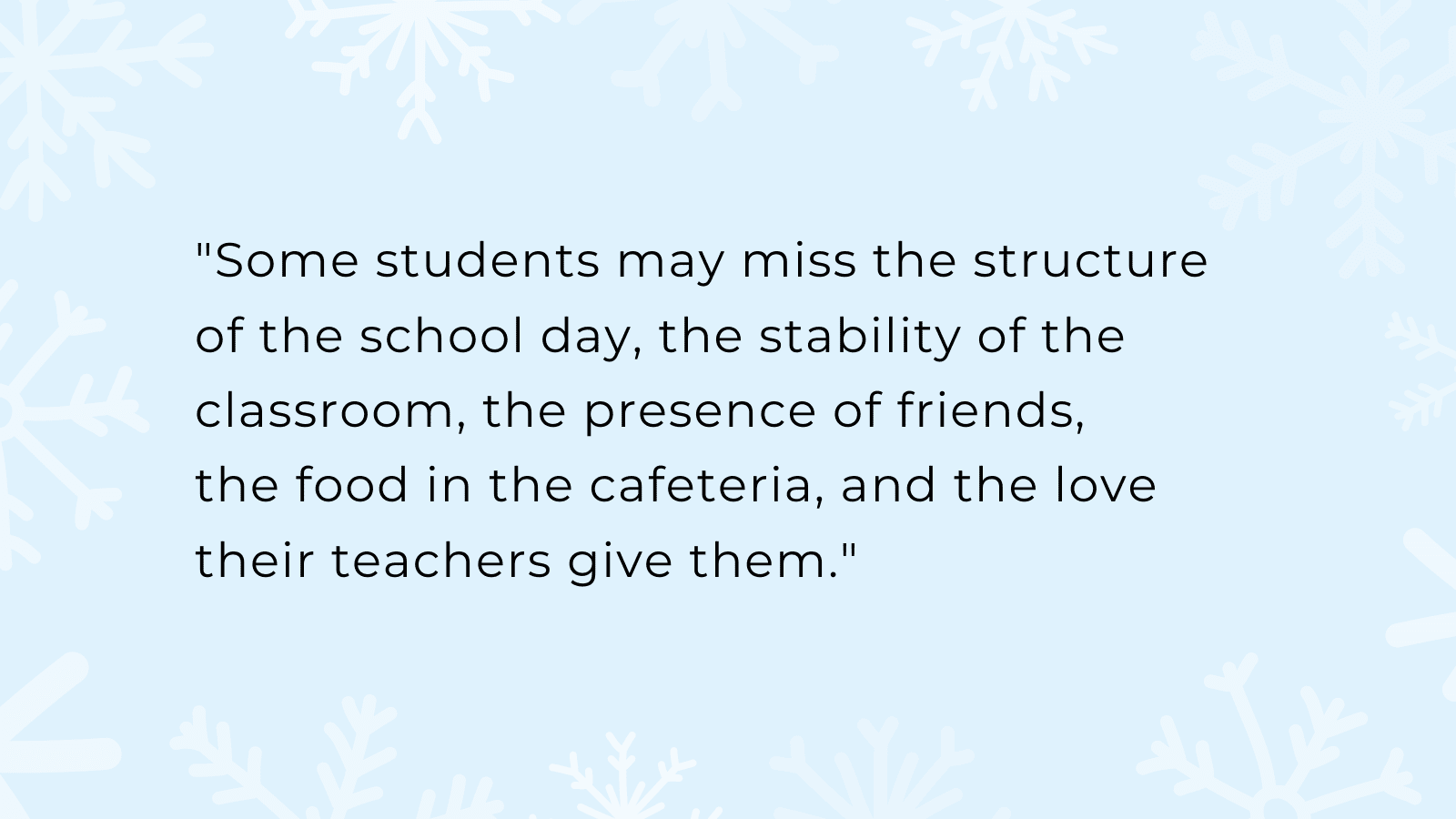One year, during the weeks leading up to the winter break, I asked my students to write about what they planned to do during their time off. Most wrote things like, “see my cousins,” “get a new gaming system,” and “go skiing.” However, one of my students turned in a blank piece of paper with just his name on it. When I asked him why he didn’t write anything, he reluctantly told me that he wasn’t excited for the break. He said all winter break meant to him was two weeks at home alone while his mother was passed out on the couch. No tree. No family dinners. Not even any presents.
It was in this moment that I realized not all students look forward to these extended breaks from school. While most kids (and teachers!) flee from school gleefully on the last day, many students like this one dread the break from school. They miss the structure of the school day, the stability of the classroom, the presence of friends, the food in the cafeteria, and the love their teachers give them.
Although we cannot change our students’ home circumstances, there are ways teachers can help their students in the weeks leading up to and during the winter break. None of these ideas take a ton of time or money, but they may help ease the stress for some of your students.
Be aware of how you talk about winter break
Of course, you can and should talk about the holidays with your students and invest in their excitement. However, be sensitive about what you say. Asking questions to the whole class like, “Who’s excited for break?” and “What are you going to get for Christmas/Hanukkah?” doesn’t apply to all students. Maybe instead ask, “What are your plans for the break?” or even challenge them with, “What is one way you can help someone in the next couple of weeks?”
[contextly_auto_sidebar]
Be a listening ear
This time of year, more than any other, is when students in my class act out the most. For some, it’s end-of-semester restlessness, but for others it is anxiety over the upcoming break. As teachers, we can pay close attention to behavior that is out of character and check in with those students individually. Have a conversation with that student who is more hyper than usual. Ask that student who keeps falling asleep how they’re really doing. Give those kids a chance to vent, and then let them know you care about them. One of the best things teachers can do for their students during this season (and all other times of the year) is to listen.
Connect students with resources when possible
There are so many coat, toy, and food drives happening during the holiday season, but students may need someone to connect them with these efforts. If you’re concerned about a student’s food security or lack of winter gear or presents, speak with your school’s guidance counselor about opportunities that might already be happening in your school or community. Avoid giving students individual gifts, even if it’s a well-intended winter coat, without speaking to school administrators and the student’s family first.
Give students an opportunity to serve
No matter what one’s circumstances are, everyone has the ability to serve others. And for most, the act of giving brings joy in return. How can your class serve together this holiday season? Could you perform acts of kindness for one another or write thank-you letters to military members stationed overseas? One of the best ways to participate in the holidays is through service, and teachers can orchestrate these opportunities for all of their students.
Brainstorm a winter break to-do list with students
Disclaimer: I’m not talking about homework here. Instead, ask students to contribute ideas of fun, simple ways they like to spend time over break, whether that is diving into a favorite book series, working on an art project, or spending more time outdoors. List their ideas on a poster or doc and let your students inspire each other. Check in with the students you’re worried about and send them home with resources to keep them busy, like library books, art supplies, etc.
Connect with students in little ways over the break
Once you identify students who are dreading the holiday, write down their names and make a point to check in with them over the break. Shoot a quick email sometime during the week to let them know that they are on your mind. Or better yet, go old school and mail them a beautiful holiday card. It does not have to be lengthy, just a personal message reminding them that they are important to you. The message that you care enough to connect with them during your time off will have more power than you know.
Enjoy this season and all the festivities that come with it. Just keep in mind that many students may not. And you, as their teacher, have a special opportunity to let them know you care.
How do you help students who may have the “Winter Break Blues?” Share in the comments below.
Plus, please don’t assign homework over winter break.


